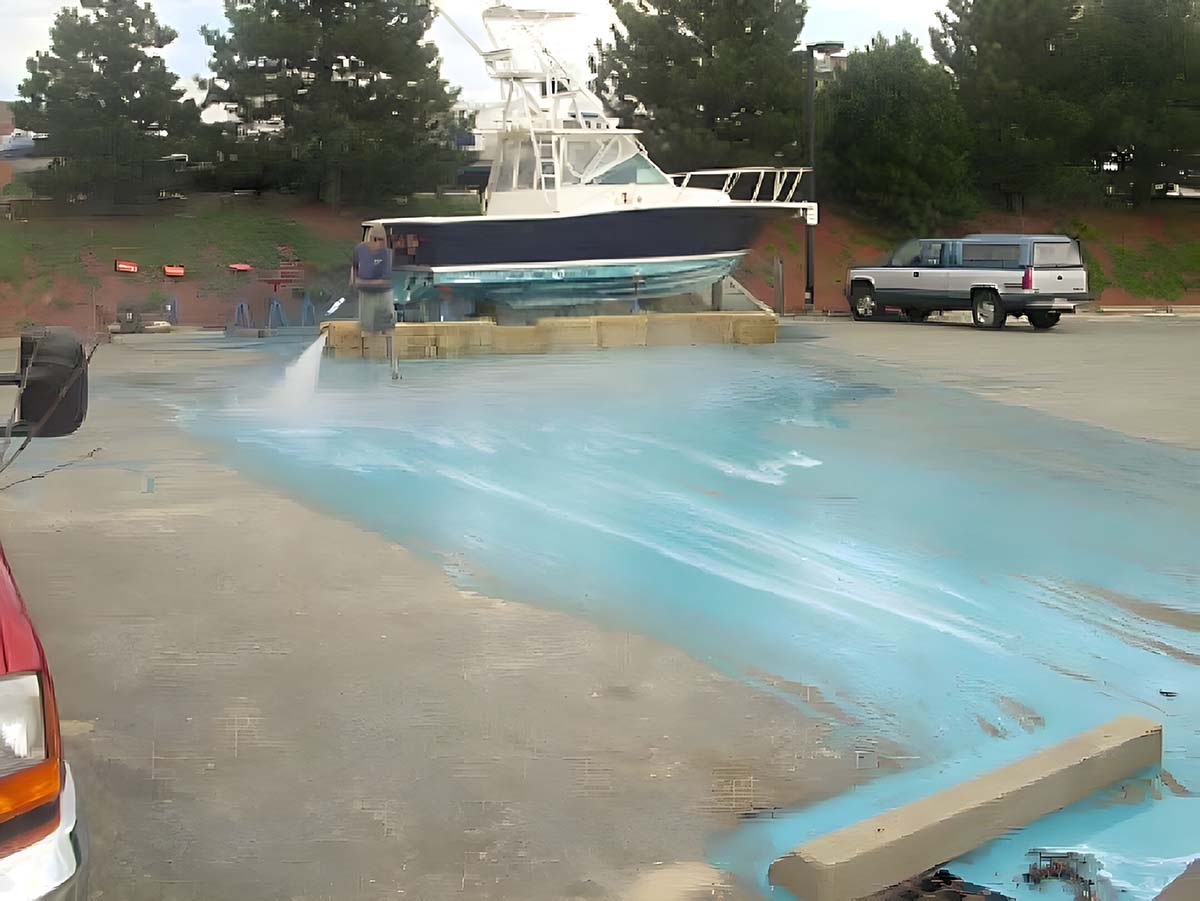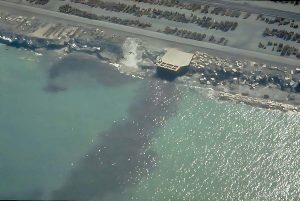
Is it Better to Ask for Permission – or Forgiveness?
Published on March 28, 2023There is an age-old question, is it better to ask for permission or forgiveness? The politically correct, most ethically correct and most long-term meaningful for the industry as-a-whole correct answer is – ask for permission. But I must admit, there have been times when the costs, frustrations and/or time required to obtain permission, or the complete unreasonableness of the regulatory authority, have made me question whether the correct answer was the right choice!
For example, we had a client who had purchased a neglected property with a lot of deferred maintenance, and they were looking to replace the somewhat crumbling concrete seawall, which was in line with the neighboring properties’ bulkheads, and to bring the new seawall across a now unused marine railway. The state reviewing agency was insisting that the new wall be brought back landward in any area where the tide now overtopped the places where the wall had partially collapsed, and to the position of the high tide line across the width of the railway. Alternately, one could smooth things out so long as there was a 2:1 mitigation for the areas “filled,” even though this would mean that the new seawall would still be landward of the neighboring properties’ bulkheads. Resolving the issue took more than a year.
Meanwhile, the U.S. Army Corp of Engineers is working on a plan to build a massive seawall seaward of all the properties’ existing waterfronts to protect the entire neighborhood from sea level rise (though yet no identified funding source for implementing the project). Should they have asked permission?
I want to say no, as it was incredibly frustrating, but then there is another property we know of where the owners rebuilt their stone seawall without permits (not realizing they were needed), and a neighbor complained, leading to a messy court case and ultimately the rebuilt wall having to be torn down and replaced with a wall that had been through the proper review process, including building department inspections during construction. This all despite the wall having already weathered a hurricane and tropical storm in its short existence.
Abide by the Law
Ignorance may be bliss, but it doesn’t usually hold up in court. As the ancient adage goes, “ignorance of the law is no excuse.”
A general manager of a large marina recently said that he spent over $300,000 to comply with a specific environmental regulation, and his board of directors kept questioning him as to why, since all of the surrounding marinas have not lifted a finger or spent a penny to comply with the same regulations.
He related that: a) it was the right thing to do to improve the environment and help keep the waters clean; b) the publicity for not complying would be devastating; c) the fine could be significant; and d) he did not want to be locked up. While he admitted that he probably would not be locked up (though prison time is technically an option for many regulatory violations), he believed he would probably have to be fired, as someone would have to be held responsible for polluting the water by not complying with the regulations.
We had a long discussion of the different paths one could follow. The bottom line was that he is a fervent believer that one should be doing the right thing.
There is no question that regulators have a job to do. It is also true that there are some regulators that go overboard (figuratively speaking), and that the industry has suffered greatly from the actions of a relatively few bad actors and the resulting blatant environmental damage.
There is a world-famous, or infamous, boatyard owner who, along with having had poor overall environmental controls, decided to bury 55-gallon drums and other containers of toxic waste within the boatyard property, all causing considerable environmental damage and eventually a guilty plea to criminal violations of the Toxic Substances Control Act, CERCLA, Clean Water Act, Resource Conservation and Recovery Act, Clean Air Act, and Hazardous Transportation Act, for illegal disposal activities, including the discharge of over 4,000 tons of pollutants. The willful act created a big backlash to the industry.
On the other hand, we have had interactions with a regulator who loved to use a microscope when inspecting marinas for compliance and a sledgehammer for assessing penalties, when a simple tap on the shoulder would have been more than sufficient.
For the most part, the environmental regulations are there to improve and maintain clean water and a healthy environment, and the recreational boating industry desires and needs clean water and a healthy environment. No one wants to swim in a cesspool, sail through an oil slick, or catch and eat fish full of toxins.
There are some regulations that do go overboard. And truth be told, there are degrees of magnitude on both sides. We live in a society where many people push the posted speed limits – most by within the generally accepted 5, 10 or 15 miles per hour over the limit window (depending on where you live), and others that believe that the chances of getting caught are so slim, due to the limited number of police per mile of road, that they simply drive as fast as they want.
The marine industry is highly visible and easily picked upon by legislators and regulators. Marinas as a whole are a fairly minor contributor to pollution as compared to the largest contributors, which in most cases are governments and agriculture. But agriculture has very large lobbies and governments often seem to operate on the principle of do as I say not as I do.
Do the Right Thing
As a former elected official, I can tell you that it is very hard to change that culture. I can also attest that it is hard to have enforcement understand that there can be a difference between the spirit versus the letter of the law/regulations.
There is no doubt that many get away without trying to do the right thing – for a myriad of reasons – and would rather pay the fine than comply. Unfortunately, this not only can come back to bite them in the wallet, but it also creates a cloud over the entire industry.
And yes, there are degrees of what is the right thing.
Some would say it is all about what risk one is willing to assume. Sort of like going 5 to 10 miles per hour over the speed limit on the highway versus 30 or 40 miles per hour over.
We urge all to do the right thing, both because it is the right thing and because not doing it causes damage to the environment, and the one common denominator that we all need for the industry to prosper is clean water and a desirable environment.
What To Do

Undertaking a thorough assessment of what regulations apply to the facility is highly recommended, including with respect to ongoing operations, existing approvals, and future work. Determine the extent of the facility’s compliance and note what has to be undertaken to remedy deficiencies. Then develop an implementation plan that builds compliance into the ongoing maintenance, as well as the capital expenditure programs for the facility. This typically proves to be the most cost-effective way to get where you ideally want to be.
We also find that most agency enforcers are willing to work with a facility if they believe that the facility is really trying to do the right thing and has been working to keep things or bring things into compliance. And unlike court, plausible ignorance can have some sway with many of those in the regulatory world.
At the same time there are various government programs to assist in compliance – some take the form of undertaking assessments without “ratting one out.” These are proactive programs and can be very helpful. As discussed in the column “BIG Time – And Other Ways to Get Money for Nothing” in the March 2023 issue of Marina Dock Age, there are also other programs that allow private/public monetary cost sharing, such as grant programs for pumpouts, transient boating facilities, cleaning up brownfields, economic development programs, and partnerships for projects that provide or enhance access by the public and/or the environment.
If one is wary of taking advantage of a governmental assessment, you can always do your own, get assistance from your insurance company, and/or use a consultant.
As enhancement programs are undertaken, be sure to communicate what is being undertaken with your customers, and, importantly, in what way or ways they will benefit. This type of communication also allows for a better understanding and acceptance by the customers as to why there may be increases in pricing.
For those thinking of selling the facility, having permits in place and being able to demonstrate regulatory compliance helps command a higher price. We have often been asked to help evaluate a purchase price, which always includes a review of compliance issues. Often the figures work out as accepting the asking price less the cost of compliance and deferred maintenance. When that is done, there have been instances where the seller should have been paying the buyer.
Our counsel is to understand what the regulations are about – what they are trying to accomplish – and set forth a program to comply. It could be all at once or over a staged period of implementation. A clean and attractive facility that is in compliance, environmentally aware, and communicates that to their customers can actually promote higher pricing and a longer-term improved bottom line. That is not fiction, it is fact.
So, the next time the choice presents itself, keep in mind what the U.S. Navy’s Rear Admiral Grace Hopper seemed to have in mind when she popularized the saying – which was more along the lines of there being times when you need to act expediently to do the right thing, and you may not have the luxury of time to ask for permission. She was suggesting being proactive and never was suggesting not doing the right thing and hope you don’t get caught.
Dan Natchez, CMP, is president of DANIEL S. NATCHEZ and ASSOCIATES Inc., a leading international environmental waterfront design consulting company specializing in the design of marinas and marina resorts throughout the world. He can be contacted by phone at 914/698-5678, by WhatsApp at 914/381-1234, by email at dan.n@dsnainc.com or online at www.dsnainc.com.
| Categories | |
| Tags |






